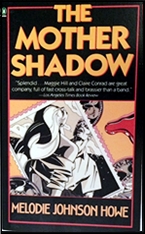Sat 18 Sep 2021
A PI Mystery Review: MELODIE JOHNSON HOWE – The Mother Shadow.
Posted by Steve under Reviews[5] Comments
MELODIE JOHNSON HOWE – The Mother Shadow. Claire Conrad & Maggie Hill #1. Viking, hardcover, 1989. Penguin, paperback, 1990.

The story is told by Maggie Hill, who is not a PI when the story begins, nor if I read it right, not even when it ends. But in between, she does find herself doing a lot of the legwork for Claire Conrad, who is a PI, albeit one of the more eccentric ones you may ever come across in a mystery novel before.
That includes even a certain Nero Wolfe, who you probably have come across and who I’ll get back to shortly. Claire Conrad is tall, brilliant, dressed all in black – or all in white – depending on which of every alternate day it happens to be. She does not believe in love, she tells Miss Hill, and in fact (she also tells her), she has had all her lady parts removed.
Maggie, on other hand, is a young, jaded, yet brassy temp worker based in Los Angeles. As the story begins, she has plenty of attitude and is not afraid to show it, but as the story continues, it is clear that she has met her match with Clair Conrad. See above.
She has been working with a wealthy man helping him catalog his coin collection, but one morning their routine is changed. With a lawyer present, he asks Maggie to type up a codicil to his will, one in which he directs his coin collection to be left to a mysterious Clair Conrad, a name she does not recognize. More importantly, he specifically states that his family – mother, brother, sister – are not to receive any proceeds from it. When done, the lawyer (a TV personality with all the charm of a snake) leaves, and Maggie’s employer goes upstairs and shoots himself.
What’s more, you guessed it, the codicil, left in Maggie’s possession, has – in the confusion – disappeared, and here is where the mystery begins. One involving a host of family secrets, some of which are quite salacious indeed, and hardly ones to mentioned in polite society. The mystery is solved more by legwork than out-and-out deductivity, not that there’s anything wrong with that. Unfortunately I did not find any of the other players involved in the tale all that interesting, and their problems even less so, for whatever that’s worth.
At the time the book was published, much was made of the Conrad/Hill relationship as compared with the Wolfe/Goodwin one. While it is of course at once obvious, I’d have to pass on that until I’ve read another one. This is only a first book, after all, and the interaction between the two is an edgy one. They’re still getting to know another.
This first book was nominated for an Edgar, and a long series was expected, but for unknown reasons, it never developed. There was only one more book featuring the two of them, that being Beauty Dies, published in 1994. After that the slate on the two was closed forever.
September 18th, 2021 at 8:19 pm
When exactly was this written?
Melodie Johnson Howe (note sp) began writing a different series about a semi-successful actress named Diana Poole; short stories (EQMM) and some novels, which have had some success in recent years.
She’s also had an internet presence, and has seen her short stories collected by Crippen & Landru.
In other words, she’s been around …
September 18th, 2021 at 9:11 pm
I don’t know much about Ms Howe, but have heard of her later Diana Poole stories. They all appeared first in EQMM. I think but am not sure if they’re all in the Crippen & Landru collection.
The two Conrad and Hill novels appeared in 1989 and 1994, a few years before she started doing the short stories. I liked this one well enough to read the second one whenever I come across my copy.
And thanks for the correction of her middle name. I hate it when my fingers make a slip like that. I guess they’re getting old on me.
September 19th, 2021 at 8:23 pm
A female Wolfe and Archie seems like a natural, but I suspect it would be harder to bring off than it sounds. Stout is only a fair maker of mystery plots, but the life and relationship of Wolfe, Archie, and their environs carry us over any dull spots, and that can’t be easy to recreate.
September 19th, 2021 at 9:32 pm
This first story didn’t remind me so much of Nero Wolfe & Archie as it did Hulbert Footner’s Madame Storey, the female PI of the pulps in the 20s and 30s, along with Bella, her constant assistant and companion.
October 17th, 2021 at 1:47 am
It’s almost a month since this post – and my comment – appeared, and something just occurred to me…
In that comment, I somehow neglected to mention what Melodie Johnson did for a living before she got into mystery writing full-time:
She was “the last of the Starlets”, by her own account – under contract to Universal Pictures, with a fair-size list of credits in movies and TV, until she dialed her acting career down in favor of marriage and family … and writing.
Her husband is Bones Howe, a prominent figure in Hollywood music circles; they’ve been together for over fifty years.
Additionally, Melodie Johnson Howe was a major contributor to the late (and much-missed) Criminal Brief blog (whose archives can still be viewed online (check ’em out).
Silly me: I always thought that all this was what she was best known for …